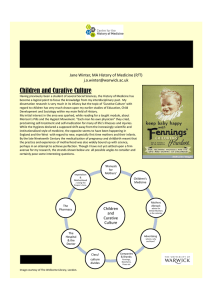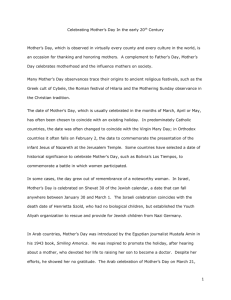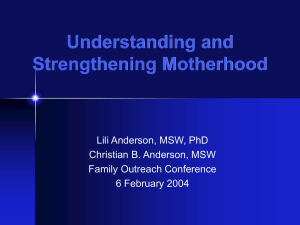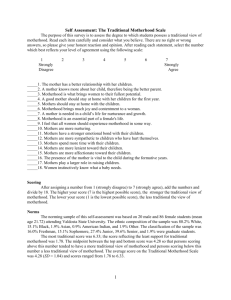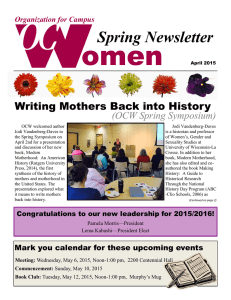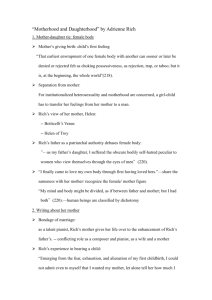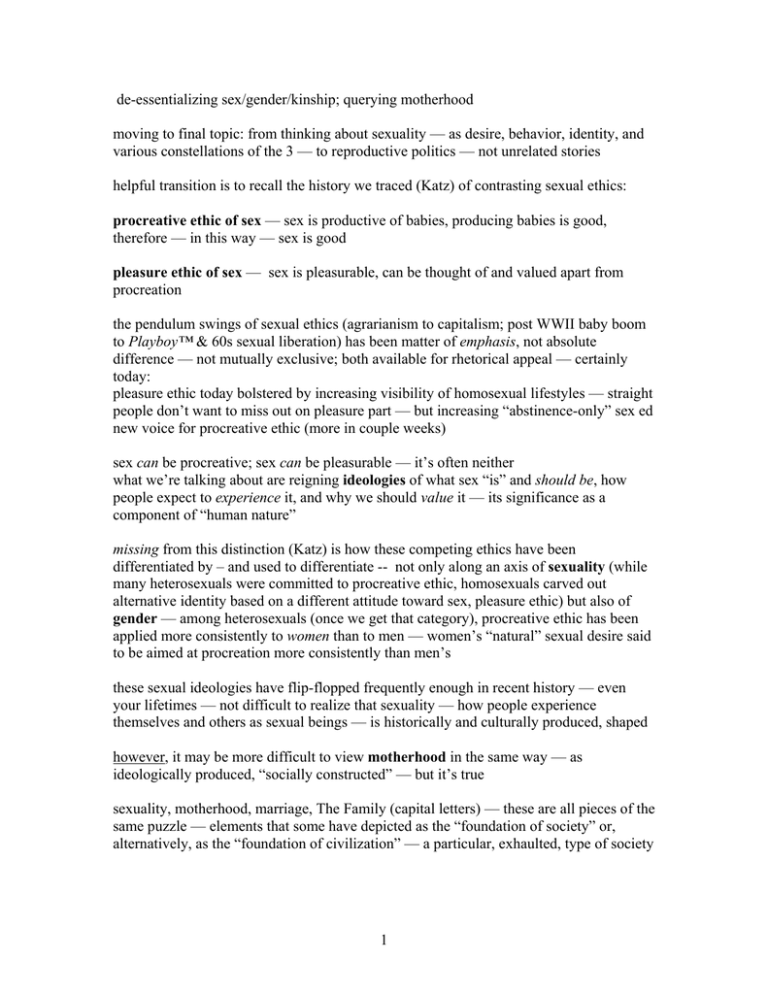
de-essentializing sex/gender/kinship; querying motherhood
moving to final topic: from thinking about sexuality — as desire, behavior, identity, and
various constellations of the 3 — to reproductive politics — not unrelated stories
helpful transition is to recall the history we traced (Katz) of contrasting sexual ethics:
procreative ethic of sex — sex is productive of babies, producing babies is good,
therefore — in this way — sex is good
pleasure ethic of sex — sex is pleasurable, can be thought of and valued apart from
procreation
the pendulum swings of sexual ethics (agrarianism to capitalism; post WWII baby boom
to Playboy™ & 60s sexual liberation) has been matter of emphasis, not absolute
difference — not mutually exclusive; both available for rhetorical appeal — certainly
today:
pleasure ethic today bolstered by increasing visibility of homosexual lifestyles — straight
people don’t want to miss out on pleasure part — but increasing “abstinence-only” sex ed
new voice for procreative ethic (more in couple weeks)
sex can be procreative; sex can be pleasurable — it’s often neither
what we’re talking about are reigning ideologies of what sex “is” and should be, how
people expect to experience it, and why we should value it — its significance as a
component of “human nature”
missing from this distinction (Katz) is how these competing ethics have been
differentiated by – and used to differentiate -- not only along an axis of sexuality (while
many heterosexuals were committed to procreative ethic, homosexuals carved out
alternative identity based on a different attitude toward sex, pleasure ethic) but also of
gender — among heterosexuals (once we get that category), procreative ethic has been
applied more consistently to women than to men — women’s “natural” sexual desire said
to be aimed at procreation more consistently than men’s
these sexual ideologies have flip-flopped frequently enough in recent history — even
your lifetimes — not difficult to realize that sexuality — how people experience
themselves and others as sexual beings — is historically and culturally produced, shaped
however, it may be more difficult to view motherhood in the same way — as
ideologically produced, “socially constructed” — but it’s true
sexuality, motherhood, marriage, The Family (capital letters) — these are all pieces of the
same puzzle — elements that some have depicted as the “foundation of society” or,
alternatively, as the “foundation of civilization” — a particular, exhaulted, type of society
1
But as Collier, Rosaldo and Yanagisako point out, “most of our talk about families is
clouded by unexplored notions of what families ‘really’ are like.”
“Confusing ideal with reality, we fail to appreciate the deep significance of what
are, cross-culturally, various ideologies of intimate relationship, and at the same
time we fail to reckon with the complex human bonds and experiences all too
comfortably sheltered by a faith in the ‘natural’ source of a ‘nurture’ we think is
found in the home.” (first page)
in other words, when we hear about families, we often stop thinking!
Why?
C, R,Y suggest that b/c family has been on private side of public/private division (itself
illusion, but with real effects for how people act) — as a society we’ve failed to grapple
with the complexity of what goes on in the name of the family, in the name of love
not merely a matter of law, but of culture — we don’t want to see legal officials
make random checks of domestic settings (which of course they do when families
are receiving state support) — aren’t a lot of checks on what happens in families
Adrienne Rich wrote in her article on “compulsory heterosexuality”: to believe
that intimacy is part of what a family/marriage is has also meant we often limit
our search for intimacy to the family – can be an inhospitable place in patriarchal
societies (law of fathers) for women and children
of course family can also be inhospitable place for gender/sexuality nonconformists — boys who like to dress up, girls who refuse to sit still or who are
overweight, etc., coming out to parents often most difficult hurdle — stakes are
high
[then again, our belief in the sanctity of the home as space of privacy has also
served — eventually — as a basis for legitimating homosexuality — anti-sodomy
laws struck down as unconstitutional, infringement on privacy]
In any event,
we need to closely examine what we mean by these terms — not just sexuality, but
family, marriage, motherhood, fatherhood — not take their meanings for granted —
recognize they are not transhistorical ‘things’, but products of particular social, political,
economic histories — and therefore subject to ongoing cultural & legal interpretation
To see them otherwise, to see them as universal and fixed (as early anthropologists did),
is to miss the specificity and maleability of our own definitions and understandings
2
from article: Bronislaw Malinowski, considered a “father” of British social anthropology,
did ethnographic research in the Trobriand Islands in the south Pacific during WWI
Malinowski argued in 1920s that yes, family = human universal, he was arguing against
19th C social evolutionists with their progress narrative of human cultural evolution
(Europeans at apex; for them, the family not “natural” but as cornerstone of “civilization”
— evidence of western moral superiority)
Malinowsi’s cultural relativism was well-intentioned
BUT undermined by fact that his argument rested on ethnocentric assumptions: that
family = nurturnance
basically, he argued that since we “need” nurturance, and families = nurturance, thus we
have families — it’s a functional definition
functionalism theoretical framework characteristic of early British social anthropology
for Malinowski:
basic human needs:
nurturance
procreation
sustenance
shelter
organization
are met through social institutions
family
kinship system
subsistence tech, division of labor
housing design
law, political systems
difference = cultural variation in ways humans meet basic needs (hunting/foraging v.
agriculture? patrilineage v. matrilineage?)
similar to how gender in 70s was seen as cultural variation of biological sex difference —
cultural elaboration of gender difference was a social “need” more or less
functioned same way everywhere
for Malinowski, “family” mapped onto:
1) distinct and bounded group distinguishable from other such groups
2) group located in physical space — hearth and “home”
3) shared affective bonds, particular set of emotions
family = conflation of genealogy/household/emotional intimacy
Collier et al. point out that this is informed by Victorian public/private division
it’s ethnocentric to claim “they’re just like us” when argument based on reading our
institutions and values onto their practices
similarly, as we’ve seen, sex/gender system itself to some extent ethnocentric: implies 2sex model of binary gender difference
(other cultures recognize other possibilities — perhaps 3rd sex/gender, perhaps
blending of binaries)
3
problem of functionalist thinking: “because a social institution is observed to
perform a necessary function does not mean either that the function would not be
performed if the institution did not exist or that the function is responsible for the
existence of the institution” (73)
just because we can describe it, “see” it, doesn’t mean that’s what’s going on
SO, instead of asking, is The Family a human universal? Need to ask: What do we mean
by family? (is there A Family?)
Instead of assuming all mothers are by definition, or by nature, nurturing and loving, we
have to ask: What does nurturance look like? Does it look different under different
circumstances? What is mother love? What makes a mother?
Instead of assuming all children better off with biological mothers, or that they “need”
both a father and a mother, we need to ask: What do we mean by “real” mothers? What
distinguishes fathering and mothering? Is what makes a “good” father similar to “good”
mothering, or different? Are both equally nurturing? If a woman who isn’t biologically
related to a child can mother, can a man mother?
remaining readings for today are about 3 quite different ethnographic cases that raise
similar questions, engage similar issues — questioning assumptions about “real”
motherhood and “real” families
1) selective maternal neglect of poor women in Brazilian shanty towns (Nancy ScheperHughes)
2) mothers of children with disabilities in upstate NY, struggling with status as “real”
mothers (Gail Landsman)
3) transracial and international adoption (Christine Ward Gailey)
each of these cases calls into question common assumptions among Americans about the
meaning and experience of motherhood — as definition and lived reality
have to understand this in context of wider meanings of personhood, love, agency,
marriage, family
divide you into 3 GROUPS to collectively analyze these case studies
• what assumptions that you held (or see as commonly held) were revealed to be
assumptions? overgeneralizations?
• how do gender, sex (action), sexuality (identity) come together in this case — or not?
• what do we learn about families, mothering, nurturing — what these are/aren’t?— how
might case study push us to rethink general understandings about what makes a
“real” family or counts as “real” mothering? — implications for current debates?
4
• other things you found interesting, challenging — agreed/disagreed with analysis
Scheper-Hughes
learning to mother means learning when to let go, but also when it’s safe to love
motherhood is ascribed, not achieved, status — if God wills
social production of indifference
mothers’ reactions to infant mortality not autonomously authored
tempered by indifference of State (barely registers these deaths, or lives)
and Church (which once celebrated child death and now wants to deny it
— while also withholding contraception and abortion)
motherhood is socially produced — not just “feelings” of “bonding” but shaped
by contingencies, necessities (poverty)
like feelings for another woman ≠ only understood in terms of desire
contrast with the social production of interest in US
a woman who chooses not to subordinate own interests to fetus is “unnatural”
Landsman
social production of interest — if a woman follows prenatal advice, should have
control of outcome — motherhood is achieved status, in our control….but not
rites of passage lacking with non-normal infant — not “real” mother
shows social construction of motherhood — rituals do help constitute it
failing that, these mothers go on to be super-achieving mothers
“learning” from child, not just teaching it
Gailey (white mother of a black child who had been abused by foster parents)
“adoption is the result of two violations of natural motherhood [in US]:
procreation without marriage and nonprocreation within marriage. So the U.S.
adoption triad has two failed mothers and a rejected or substitute child as the
major players” (22) — how does that characterization strike you?
• often, “natural motherhood” script not extended to birth mothers in adoption,
transformed into “bad mother” — sexually active, able to procreate, but unable or
unwilling to nurture; irresponsible; portrayed as victim (raped?)
myths of mothers who give up child for adoption
in reality, 2% unmarried births —> adoption; women who give up babies
for adoption higher education and class aspirations than women who keep
• other side: similar to mothers of children with disabilities (especially “difficult
to place kids”) — the harder the child rearing, the more they become “real”
parents — achieved motherhood — thrilled when they “earn” affection of child
contrast to international adopters more likely to “return” child for “failing to
5
bond” — entitled to immediate love a child (paying for it!?)
ironies of how placements are made?
“difficult” children — older, survivors of abuse, w/disabilities — placed
with single parents, black parents, interracial parents
the kids who need the most help placed with people with fewest resources
WHY?
stratification of social reproduction — reproducing class status from one
generation to the next
What do we learn from the juxtaposition of 3 cases?
6
MIT OpenCourseWare
http://ocw.mit.edu
21A.231J / WGS.455J Identity and Difference
Spring 2006
For information about citing these materials or our Terms of Use, visit: http://ocw.mit.edu/terms.

